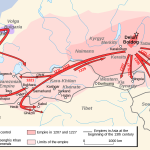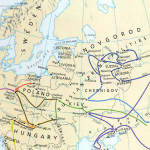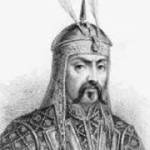Did the death of one man in Mongolia affect the entire course of European history since the 1200s?

Here’s the context: In 1227, Genghis Khan’s son Ogedai became head of the Mongolian empire, which at that time included much of northern China, southeastern Russia, and Persia. Ogedai sent one of his generals, Tsubodai (or Subotai), to conquer the rest of Russia and to go as far west as he could, and to stop only if he came to the fabled western sea. Tsubodai’s Mongolian army, which came to be known as the Golden Horde, was enormously successful, sweeping easily through Russia, taking Moscow, then Kiev in the Ukraine, and on into central Europe, winning major battles in Poland and Hungary.

Most military historians judge that no European force could have stopped the disciplined and innovative Mongolian armies. “Employed against the Mongol invaders of Europe, knightly warfare failed even more disastrously for the Poles at Legnica and the Hungarians at Mohi in 1241” [1].
Vienna was next, and after that the rest of Europe would have been easy pickings.
But an unexpected event occurred: Ogedai died young.
And then a burning succession question: Who would be the next great Khan? Would it be Genghis’s sole surviving brother? One of Genghis’s sons, now ruling as khan over their Persian and Arab possessions? Or one of his grandsons, some of them off conquering Europe with Tsubodai? And would the succession be peaceful or violent? All of that could only be decided back in the new Mongolian capitol city, Karakorum.
So the Mongol army in Europe suddenly stopped its advance, turned around, and started on the 4,500 mile trip home.
And we have a tantalizing “what-if” history scenario. Conn Iggulden puts the thesis strongly:

“Politics intruded on Tsubodai’s ambitions. If it had not, all history would have changed. There are not many moments in history when the death of a single man changed the entire world. Ogedai’s death was one such moment. If he had lived, there would have been no Elizabethan age, no British Empire, no Renaissance, perhaps no Industrial Revolution. In such circumstances, this book could very well have been written in Mongolian or Chinese” [2].
Sources:
[1] The New Encyclopaedia Britannica (15th edition), Volume 29, p. 663.
[2] Conn Iggulden, Epilogue to Empire of Silver, p. 438.
Related: Hegel’s Philosophy of History, in the Philosophers, Explained series.
This is the background for Neal Stephenson et al’s Mongoliad: http://mongoliad.com/
While the Battle of Mohi did devastate the Hungarian kingdom, the inability to capture Bela Arpad was telling. It can be counter argued that the Mongols were overstretched at that point, and early surprise successes and their use of a feigned retreat would not have continued to work. Their inability to conquer the Southern Sung (until 1290 or so) was a drain on the military and focus. Quickly conquering the steeps of Ukraine and the Khawarizdun (Persia) lands is one thing. Conquering and holding Europe with its many mountains, river valleys, and fractious ethnicities is another.
I do like the what-if game though. IF Subotai, one of the top-ten military geniuses of all time with a military to match, had the go ahead from Ogedai might it make Holy Roman Emperor Frederick II and the Pope drop their dispute? Would the Venetian spies already in the Mongol lands that were used to destroy the Genoese and Pisa black sea settlements turn their attentions to stopping the Mongols? Would France turn its attention east, and let Henry III revive his Angevin empire ambitions? Would Bela, the “second father of Hungary” lead a counter crusade? Would the Hungarians relearn the tactics they learned on the steppes and push back the Mongols?
The What-if game makes history fascinating, and a great lesson in action-meets-consequence.
–Matthew Iskra
Why he no come back and finish the job?
Question is also how the mongols might have coped with longbows – just appearing as the normal missle weapon of the English…